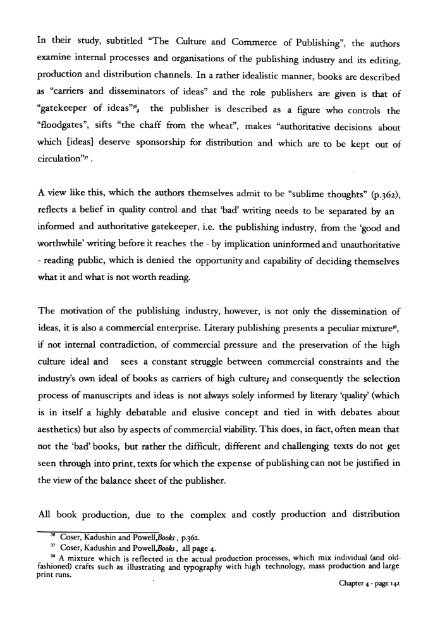From Page to Screen - WRAP: Warwick Research Archive Portal ...
From Page to Screen - WRAP: Warwick Research Archive Portal ...
From Page to Screen - WRAP: Warwick Research Archive Portal ...
You also want an ePaper? Increase the reach of your titles
YUMPU automatically turns print PDFs into web optimized ePapers that Google loves.
In their study, subtitled "The Culture and Commerce of Publishing", the authors<br />
examine internal processes and organisations of the publishing industry and its editing,<br />
production and distribution channels. In a rather idealistic manner, books are described<br />
as "carriers and dissemina<strong>to</strong>rs of ideas" and the role publishers are given is that of<br />
"gatekeeper of ideas'l", the publisher is described as a figure who controls the<br />
"floodgates", sifts "the chaff from the wheat", makes "authoritative decisions about<br />
which {ideas} deserve sponsorship for distribution and which are <strong>to</strong> be kept out of<br />
circulation"? .<br />
A view like this, which the authors themselves admit <strong>to</strong> be "sublime thoughts" (P.362),<br />
reflects a belief in quality control and that 'bad' writing needs <strong>to</strong> be separated by an<br />
informed and authoritative gatekeeper, i.e. the publishing industry, from the 'good and<br />
worthwhile' writing before it reaches the - by implication uninformed and unauthoritative<br />
- reading public, which is denied the opportunity and capability of deciding themselves<br />
what it and what is not worth reading.<br />
The motivation of the publishing industry, however, is not only the dissemination of<br />
ideas, it is also a commercial enterprise. Literary publishing presents a peculiar mixture",<br />
if not internal contradiction, of commercial pressure and the preservation of the high<br />
culture ideal and sees a constant struggle between commercial constraints and the<br />
industry's own ideal of books as carriers of high culture; and consequently the selection<br />
process of manuscripts and ideas is not always solely informed by literary 'quality' (which<br />
is in itself a highly debatable and elusive concept and tied in with debates about<br />
aesthetics) but also by aspects ofcommercial viability. This does, in fact, often mean that<br />
not the 'bad' books, but rather the difficult, different and challenging texts do not get<br />
seen through in<strong>to</strong> print, texts for which the expense ofpublishing can not be justified in<br />
the view ofthe balance sheet ofthe publisher.<br />
All book production, due <strong>to</strong> the complex and costly production and distribution<br />
36 Coser, Kadushin and Powell,Books, P.362.<br />
37 Coser, Kadushin and Powell,Books, all page 4.<br />
38 A mixture which is reflected in the actual production processes, which mix individual (and oldfashioned)<br />
crafts such as illustrating and typography with high technology, mass production and large<br />
print runs.<br />
Chapter 4 - page 142





